NARBO
NARBO held a session on IWRM in Regional Process
in the 7th World Water Forum
koichiro OMOTO
NARBO secretariat
![]()
It is widely known that with recent rapid increasing demand from agricultural, urban, and industrial sector, water distribution have been a crucial theme. In addition, water related disasters caused by typhoons and droughts have been occurring quite often. Moreover, fresh water supply, sanitation and environment of which waste water management and water quality management are typical examples, are also problems to be solved at river basin level in Asia and the Pacific. During this decade, each River Basin Organization has tackled with these issues.
To deal with the above issues, NARBO held the regional session named “SMART Implementation of IWRM / Future IWRM in Asia-Pacific What we have achieved and an outlook by focusing on the river basin level” in HICO, Gyeongju, the Republic of Korea (ROK) on 13 April because NARBO was asked from Asia Pacific Water Forum and Korea Water Forum to become one of the session organizers with UNESCO and UNESCAP in the 7th World Water Forum in ROK. This session aimed at reviewing past achievement and discussing future directions on IWRM in the Asia-Pacific by sharing knowledge and experiences of participants achieved through their activities based on their footprints.
In the afternoon of 13 April in Gyeongju, though it was a cold and rainy day, the meeting room in HICO where NARBO held a regional session was filled with passionate heat and excitement of about 70 participants. The5 session was started by MC of this session, Dr. Kentaro Kido, the Vice Secretary General of NARBO and the Director of International Affairs Division, Japan Water Agency.
Opening remarks was given by Mr. Choi Byoung Seub, the Vice President of K-water. Mr. Choi explained K-water had contributed to the establishment of IWRM in ROK with their technology and indicated that he hoped this session would be a good opportunity for all the participants to share various experiences and to be a milestone to resolve water issues.
H.E. Dr. Baski Hadimoeljono, the Minister of Public Works and Housing, Republic of Indonesia and ex-Chairperson of NARBO, kindly delivered keynote address on IWRM in Indonesia. He introduced Water Resources Law in Indonesia which consisted of four dimensions-Conservation, Utilization, Potential Control and Information System. He also expressed his gratitude to NARBO for continuous networking activities and awarded his successor, Dr. Keizrul Bin Abdullah, incumbent Chairperson of NARBO, and Dr. Muhammad Amron, current Senior Advisor of NARBO. Dr. Basuki presented commemorative gift to them as a token of contribution.
Following these speeches, various examples of implementation of IWRM in Asia were introduced.
Mr. Jongjin Lee, the General Manager in Water operational Center of K-water gave presentation on 1) Current situation, 2) History, and 3) Future of the of water resources management in ROK.
Dr.Kido introduced “NARBO IWRM Indicator” and explained some RBOs in Asia had tried their efforts for the progress of water resources management by using this. IWRM indicator was made by NARBO for the organizations which were facing difficulty in implementing IWRM and he emphasized this would be useful to measure how to proceed with IWRM spiral more concretely and easily. All the participants paid attention to his presentation and some took photos of this presentation.
After finishing these presentations, the panel discussion was held with Dr. Keizrul Bin Abdullah, the chairperson of NARBO as a moderator. The attending panelists were, as follows:
- Ms. Dolores Hipolito, Project Manager of Flood Control Office, Department of Public Works and Highways (DPWH), the Philippines
- Dr. Arun Shrestha, Regional Program Manager of River Basin, International Centre for Integrated Mountain Development (ICIMOD)
- Mr. Vadim Sokolov, Deputy Director of Scientific Information Center/Regional Coordinator, GWP CACENA
- Ms. Priyanka Dissanayake, Regional Coordinator, Global Water Partnership South Asia (GWP-SAS)
- Prof. Guan Yiqing Hohai University / GWP, China
Abstract of key messages on Panel discussion is as follows:
-Ms. Hipolito reported current situation on IWRM implementation in the Philippines. She said that there were many challenges for the implementation of water management at ground level due to lack of standardized approach.
-Dr. Shrestha expressed that water resources management in transboundary river basins was of highly importance, effective especially for coordination with different stakeholders. Adding to this, he also introduced ICIMOD’s activities of technical cooperation on IWRM among Government, NGOs, and Private sector with touching upon its case study.
-Mr. Vadim Sokolov told as some people didn’t recognize what IWRM was in this area, 1) bottom-up as well as top-down approach is more effective, 2) linkage of stakeholders, making use of combination of bottom-up and top-down approach was necessary to implement IWRM. He also suggested the proper law to coordinate with stakeholders be put in place.
-Ms. Priyanka Dissayanake introduced a three-point lesson learnt from the case study of Mahaweli River Basin in Sri Lanka such as 1) to improve water security through IWRM, 2) to reduce overuse and inequitable sharing of water, and 3) to introduce better water management practices, application of modern irrigation technologies. She also mentioned that establishing inter-agency cooperation is mandate to promote effective water resource management in the transboundary river basin.
-Prof. Guan Yiqing showed the case of Huai River Basin in People’s Republic of China (PRC) and expressed his opinion that it ought to be addressed 1) Water Demand Management, 2) Waste Water Management, 3) Capacity building, 4) Stakeholder Participation, and 5) Water Diversify. He also commented that Water Diversity would be the key resilience to cope with climate change and pressure for water use.
Some participants asked questions on various case studies and exchanged opinions on respective cases.
Lastly, Dr. Keizrul summarized these discussions and the participants agreed to send strong positive messages of this session as follows:
1. Re-affirm that IWRM is an adaptive management process that adopts an inclusive approach bringing stakeholders together to increase water security and improve water governance,
2. Re-acknowledge that the Asia-Pacific region has ample experience and knowledge and innovative technology on IWRM to be shared,
3. Endeavor to make more opportunities of sharing experience and knowledge and enhance networking in the region to bridge the gaps in a smart way,
4. Contribute to achievement of international goals and target such as Sustainable Development Goals (SDGs) on water and IWRM and resolve to take follow-up actions, and
5. Endeavour to improve our engagement with donors, UN-agencies, civil society, private sector, decision-makers and with actors outside the water sector to ensure that water is integrated into key socio-economic development decisions.
These messages were also reported in the synthesis session of regional process in Asia and the pacific on 15 April. We, NARBO, will continue working to attain these messages as above.
You can get the final report and the regional process of the 7th World Water Forum at following website.
http://www.worldwaterforum7.org/outcome/overview.asp
http://www.worldwaterforum7.org/outcome/fo/view.asp?notice_seq=27&key=&keyWord=&sh_forum_gb=&page=1
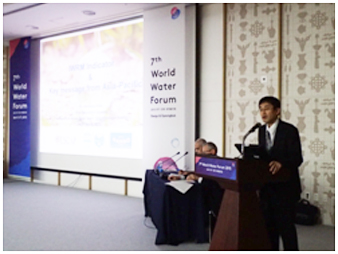 |
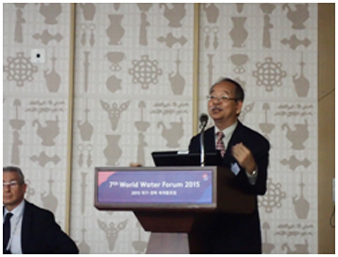 |
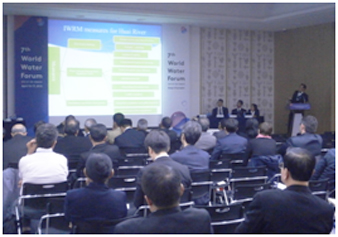 |
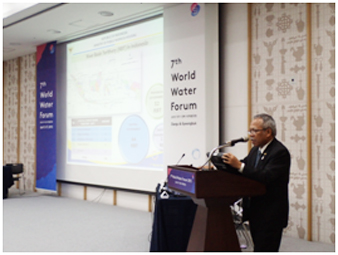 |
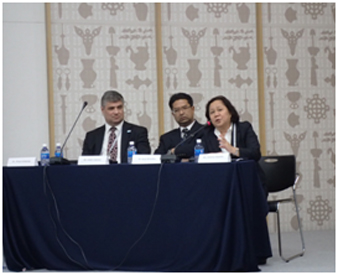 |
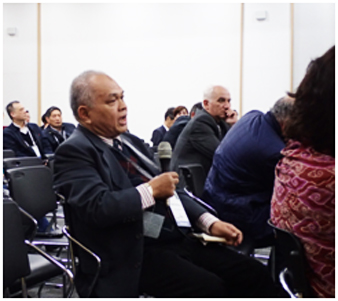 |
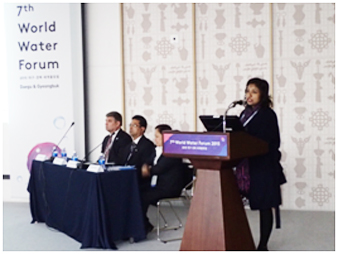 |